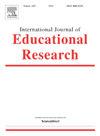Emotions in classroom video evaluation—The interplay of student teachers’ joy and anger and the quality of classroom management in video clips
IF 2.5
3区 教育学
Q1 EDUCATION & EDUCATIONAL RESEARCH
引用次数: 0
Abstract
In teacher education, classroom videos are frequently used to promote student teachers’ professional competence and initiate reflection. However, observing classroom videos triggers not only cognitive but also emotional processes, which are closely interconnected and may influence each other. Evaluating the presented teaching quality, therefore, might initiate emotions while these emotions, at the same time, might inform the evaluation. Therefore, we aimed to investigate the relationship between the presented teaching quality (represented by classroom management) of classroom videos and student teachers’ evaluation thereof.
In this correlational study, 617 student teachers observed pre-selected videos showing either effective or improvable classroom management as assessed by experts, stated their emotions (joy/anger) and, subsequently, evaluated classroom management quality using rating items. Repeated-measures ANOVA revealed that student teachers felt significantly more joy and less anger when observing effective as opposed to improvable classroom management, indicating that participants’ emotions can at least partially be ascribed to teaching quality differences between the clips. Additionally, regression analyses showed that joy correlated positively, anger negatively with student teachers’ subjective classroom management evaluation and explained for significant amounts of variance therein regarding different classroom management aspects (R²: 15 % - 64 %).
Findings underline the need for conscious usage of videos in teacher education and indicate that student teachers’ emotions during video observation should be considered in designing video-based learning environments as they enlarge the range of possibilities regarding how to integrate videos into teacher education courses.
课堂视频评价中的情绪——视频片段中学生教师的喜怒与课堂管理质量的相互作用
在教师教育中,课堂视频经常被用来提高学生教师的专业能力,引发反思。然而,观看课堂视频不仅会引发认知过程,还会引发情感过程,这两个过程密切相关,可能会相互影响。因此,评估当前的教学质量可能会引发情绪,而这些情绪同时可能会为评估提供信息。因此,我们旨在调查课堂视频呈现的教学质量(以课堂管理为代表)与学生教师评价之间的关系。在这项相关研究中,617名实习教师观看了预先选择的视频,这些视频显示了专家评估的有效或可改进的课堂管理,陈述了他们的情绪(喜悦/愤怒),随后使用评级项目评估课堂管理质量。重复测量方差分析显示,当观察到有效的课堂管理而不是改进的课堂管理时,实习教师明显感到更多的快乐和更少的愤怒,这表明参与者的情绪至少可以部分归因于视频之间教学质量的差异。此外,回归分析显示,喜悦与学生教师的主观课堂管理评价呈正相关,愤怒与学生教师的主观课堂管理评价负相关,并解释了不同课堂管理方面的显著差异(R²:15% - 64%)。研究结果强调了在教师教育中有意识地使用视频的必要性,并表明在设计基于视频的学习环境时应考虑学生教师在视频观察期间的情绪,因为它们扩大了如何将视频整合到教师教育课程中的可能性范围。
本文章由计算机程序翻译,如有差异,请以英文原文为准。
求助全文
约1分钟内获得全文
求助全文
来源期刊

International Journal of Educational Research
EDUCATION & EDUCATIONAL RESEARCH-
CiteScore
6.20
自引率
3.10%
发文量
141
审稿时长
21 days
期刊介绍:
The International Journal of Educational Research publishes regular papers and special issues on specific topics of interest to international audiences of educational researchers. Examples of recent Special Issues published in the journal illustrate the breadth of topics that have be included in the journal: Students Perspectives on Learning Environments, Social, Motivational and Emotional Aspects of Learning Disabilities, Epistemological Beliefs and Domain, Analyzing Mathematics Classroom Cultures and Practices, and Music Education: A site for collaborative creativity.
 求助内容:
求助内容: 应助结果提醒方式:
应助结果提醒方式:


